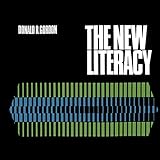The New Literacy / Donald R. Gordon.
Material type: TextSeries: HeritagePublisher: Toronto : University of Toronto Press, [1971]Copyright date: ©1971Description: 1 online resource (193 p.)Content type:
TextSeries: HeritagePublisher: Toronto : University of Toronto Press, [1971]Copyright date: ©1971Description: 1 online resource (193 p.)Content type: - 9780802061201
- 9781487571764
- 001.5 19
- P90 .G56 1971eb
- online - DeGruyter
| Item type | Current library | Call number | URL | Status | Notes | Barcode | |
|---|---|---|---|---|---|---|---|
 eBook
eBook
|
Biblioteca "Angelicum" Pont. Univ. S.Tommaso d'Aquino Nuvola online | online - DeGruyter (Browse shelf(Opens below)) | Online access | Not for loan (Accesso limitato) | Accesso per gli utenti autorizzati / Access for authorized users | (dgr)9781487571764 |
restricted access online access with authorization star
http://purl.org/coar/access_right/c_16ec
Man today faces a central challenge: to deal with exploding knowledge in circumstances that allow few errors. To survive, he must improve his perception of what is going on around him. In this he can be helped by the radically different modes of expression that have eclipsed the three Rs. But first he must learn to use them - and that will require the same type of rigorous preparation we know is needed to master reading and writing. This book is a primer for the new literacy of the 1970s. It is a provocative exploration of how we perceive reality. Professor Gordon considers how our minds and senses perceive and communicate and how we may augment them, mechanically, chemically, and in other ways. Next he discusses the ways in which we make contact with one another through language. Then he delves into the agents that extend our senses by proxy - print, radio, television, film, and the various subliminal media such as the underground press, the speakers' circuit, and pop music. Finally he offers some predictions and advice about coping with the future. Donald Gordon is a long-time student of communications. He approaches the subject with unusual breadth of experience in the mass media - he has been a journalist, broadcaster, and television correspondent - as well as with scholarly concern for changing patterns and social impact. His book is at times irreverent, always provocative and informative. It has been assigned as the textbook for 'Arts 100,' a university credit course he is giving over the Ontario Educational Communications Authority TV network.
Mode of access: Internet via World Wide Web.
In English.
Description based on online resource; title from PDF title page (publisher's Web site, viewed 01. Nov 2023)


